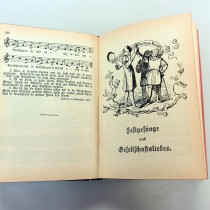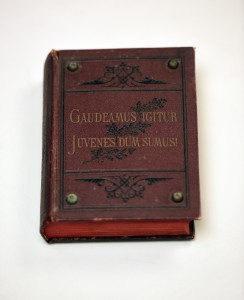Magazine

Perfect Harmony
Detroit’s Harmonie Club was once the hub of German singing groups, whose music fueled fellowship and cultural pride. When the Harmonie Club went belly up, its historic German music was in danger of being lost forever—but found a safe home at the Bentley.
by Robert Havey
The mid-1800s saw a surge of immigration to the United States from Europe, in particular from Germany. As the vast number of migrants spread out from the East Coast and settled in cities across the Midwest, many of their customs became immediately integrated into the American melting pot. From Christmas trees to hot dogs, unique German traits became simply American. German culture would persevere, however, in the rathskellers and concert halls all over the country with two great German loves: group singing and great beer.
In 1893, members of the Gesang Verein Harmonie Singing Society—known later as, simply, the Harmonie Club—opened a building in downtown Detroit to serve as a gathering place for the city’s German-American population. The building featured a restaurant and basement bar, as well as a large auditorium and rehearsal spaces for singing groups. These groups, known as sängerbunds, were choirs that sang traditional German songs. The Harmonie Club had professional sängerbunds, but also kinderchors for children and many groups in between. Membership in the newly opened club soared. It was the heart of German-American life in Detroit.

This songbook in the Harmonie Club collection has metal studs embedded into its cover, presumably to keep it from getting stained if placed where beer has been spilled.
Massive singing festivals, or sängerfests, allowed choirs to meet other groups from all over the Midwest. The Detroit Sängerfest in 1930 had more than 4,000 singers from 110 groups. Each sängerfest would start with performances from individual choruses and end with every singer packed on stage in a “mass chorus.” The sound of thousands of singers belting classical German songs was enough to shake the walls of the auditorium.
The Harmonie Club building still stands in Detroit, but no sängerbunds call it home after it went bankrupt in 1974. The music was saved and moved to multiple locations, eventually combining with music from the Concordia Club in Birmingham, Michigan. In 2015, the Bentley acquired six boxes of records from Karl W. Heidemann in Rogers City, Michigan, tracing the more than 100-year history of the Harmonie Singing Society.
One artifact in particular survived and is stored at the Bentley: a songbook bound beautifully in leather with four brass studs attached to its front and back. Why the studs? To prevent the music from getting ruined after being set down on a beer-sloshed bar in between songs!
